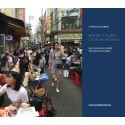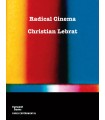Photography book by Christian Lebrat, photographer and filmmaker.
 Our terms and conditions of use
Our terms and conditions of use
(edit with the Customer Reassurance module)
 Delivery policy
Delivery policy
(edit with the Customer Reassurance module)
Christian Lebrat’s impressions of a “calm morning” in fact document the turbulent undercurrents of a society in ux. Early in the book, a political demonstration against North Korea faces the central palace anked coolly by its mountains. A picturesque shantytown of disheveled rooftops surrounded by skyscrapers in the center of the city are, at this writing three years later, already demolished for urban gentri cation. A lively street full of chicken and beer restaurants is today the site of a bitter demonstration by young Koreans to protect the original shop on this street from the predatory chain that has bought all the buildings and is shutting down their competitors. But let it remain calm! For Christian Lebrat, this peaceful, joyful trip to Asia on the eve (calm morning?) of the corona pandemic represents the freedom of adventure in a country of contrasts. The “Seoul of Asia” has much to offer the tourist, from temples to subways, from seasides to mountains to downtown night life. The ironies are not lost on Lebrat: an offering of Buddhist souvenirs faces a garbage sorting site; a seemingly fancy hotel advertises outcall massage on their Kleenex boxes; a peaceful lotus pond abuts a crisscrossing of electrical wires above a busy street. This is a country of contradictions, most notably between its visible surfaces (from the architecture of the city to the cosmetics and plastic surgery of its citizens) and the deeper stresses of the peninsula’s politics and history.
But indeed these are just “impressions”. Throughout Lebrat’s journey, a story of friendship invigorates the images, neutralizing the contradictions. He is not a tourist but an invited guest, in Korea to show his lm work. His travels are not random but guided by companions who know the terrain well, the most interesting sites and the tastiest restaurants. And the book itself can be read like a lm, following his adventure. In that respect this book is the trace of his visit – the “impressions” in fact on him by the place and the people who welcomed him.
Pip Chodorov




